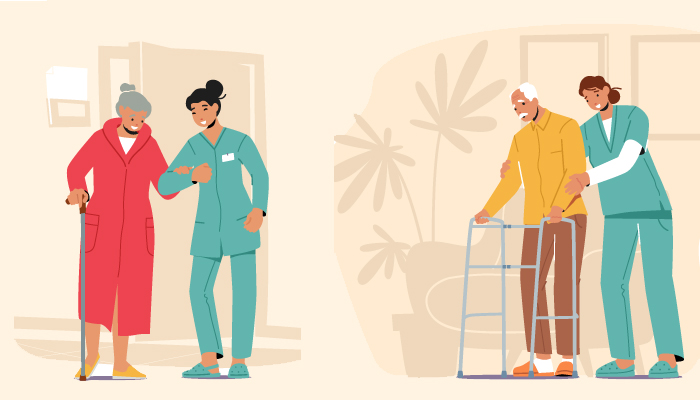Learn more at seriousillness.org/roanoke or seriousillness.org/lynchburg
Skilled nursing facilities
After a hospital stay, the person you care for may not be ready to recuperate at home. They may still need access to medical personnel, just not with the acute need of the hospital. Enter the skilled nursing facility—sometimes referred to as “rehab”—with a strong team of professionals that work together to help your relative improve. A stay in rehab isn’t “rest and recuperation.” It’s designed to rebuild strength and function for a safe return home.
Making the transition to "rehab"
 It’s good news if your loved one is sent to a rehab facility after a hospital stay. It means the doctor expects that, with therapy, your family member might resume usual activities or learn to adapt to new challenges following an injury or illness. The rehab experience frequently lasts several weeks and can be intense.
It’s good news if your loved one is sent to a rehab facility after a hospital stay. It means the doctor expects that, with therapy, your family member might resume usual activities or learn to adapt to new challenges following an injury or illness. The rehab experience frequently lasts several weeks and can be intense.
No hospital gowns here!
Your loved one will need comfortable workout clothes labeled with their name.
Patient motivation is key. Shortly after admission, the rehab staff will assess your relative and set specific goals. Daily physical therapy, speech therapy, and/or occupational therapy will be used to achieve those goals. Patients are expected to participate at least one hour per day.
This regimen may seem overwhelming to the person you care for. And therapists have different styles. Some praise and others are more commanding. Encourage your relative to give feedback if a particular style is not helpful.
Help the team connect with your family member. You can do this by providing perspective from the past and continuity with your relative’s future:
- Attend the “care planning” meetings. This is when staff members from all departments discuss a patient’s goals and progress. Ask questions here!
- Ask for staff observations and tips, but be sensitive to your loved one’s privacy.
- Visit when you can, and consider attending treatment sessions to give support. Balance encouragement of your family member with realistic expectations.
Patients leave rehab when they meet their goals. Or when they “plateau,” meaning that they are no longer improving. Lack of participation is also a reason for discharge. Usually some form of care or therapy will still be needed. Work with the facility to create a discharge plan that addresses things such as exercises at home, visits from a home health nurse, or follow-up at a clinic.
Return to topWho is who?

If your family member is discharged from the hospital to a skilled nursing facility (SNF), their care will be in the hands of a team of specialists. It’s a good idea to understand the players’ roles so you know whom to call upon for what.
- Director of nursing. This professional oversees residents’ medical issues. Also, the nursing staff. Their job includes tracking delivery of prescriptions and monitoring each resident’s physical health. They also work with the SNF’s doctor to carry out orders for therapy.
- Social workers. Trained to address social, emotional, and psychological issues, social workers help residents and families adjust to life in the facility. When the time comes for discharge, they also help ease the transition. If there’s something you want done differently with your loved one, you might start a conversation with the social worker.
- Certified nursing assistants (CNAs). The CNAs are the frontline staff. From answering a call button to helping with bathing and dressing, they are often the biggest part of your relative’s daily experience.
- Therapists. Depending on your loved one’s challenges, daily therapy may be required. A physical therapist helps improve walking, range of motion, stamina, and flexibility. A speech therapist helps residents recover language abilities. Or overcome swallowing problems. An occupational therapist uses exercises and assistive devices to regain daily life skills. They teach new strategies for self-care tasks such as feeding, dressing, and bathing.
- Dietitian. Every resident has a food plan. This is based on their personal preferences and any medical restrictions (e.g., low fat, low salt, low sugar).
- Activities director. This professional organizes activities for residents’ social and mental stimulation.
- Housekeeping. Is the bed rail not releasing? Is there a spill to be cleaned? These are responsibilities of the housekeeping staff.
The care plan and meeting
If your loved one is admitted to a skilled nursing facility, Medicare requires the staff develop an initial, personalized care plan within the first 48 hours. This describes who should be doing what. Then, within the first 14 days, the staff must assemble a comprehensive assessment, which must include your loved one’s needs and strengths. Also their goals of treatment, personal preferences, and a brief life history.
After that, within a week, a formal care plan meeting of all the care team members—including your relative if they are able—is required, to develop a durable roadmap for care based on the assessment. As your family member’s representative, you have the right to be involved in the plan and meeting.
The care plan lays out what services are needed to support the person you care for toward achievable physical, mental, and psychosocial well-being. For example, physical, speech, or occupational therapy sessions. And it identifies dietary guidelines and food preferences. Overall, the plan must tie into and support your loved one’s stated goals.
Here’s how you can help:
- Before the meeting. Ask your relative what’s going well and what’s not. What do they prefer would happen? Help prioritize their questions and requests.
- During the meeting. Help the staff understand how best to communicate and work with your family member. Keep your relative’s goals and preferences at the forefront. You can ask questions or request changes if you don’t understand or don’t agree with staff recommendations. Take thorough notes. You also have a right to a written copy of the plan.
- After the meeting. Monitor how the care plan seems to be working and definitely talk to staff if questions arise.
Build bridges with a collaborative approach rather than a confrontational mindset. If this sounds daunting, give us a call at 800-789-0586 (toll-free). We can serve as your loved one’s advocate.
Contact us at 800-789-0586 (toll-free)
